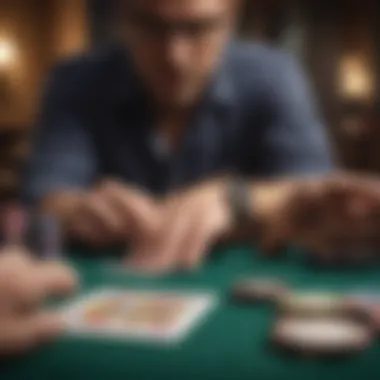Learn the Art of Bicycle Poker: A Detailed Guide


Intro
Bicycle Poker, a fresh twist on the classic card game, brings together strategy, luck, and a camaraderie that makes it irresistible for players of all strikes. Deeply rooted in the fabric of casual gaming, it diverges from the conventional rules of poker while still maintaining that heart-pounding excitement. For those who have roamed the tables in smoky basements or sunlit parks, the allure of Bicycle Poker lies in its uncomplicated setup coupled with its strategic depth.
As the name suggests, this variation invites players to take their poker game on the road — or at least, the backyard. The game often employs a standard deck alongside a few unique rules that can spice up the gameplay. Whether you're a newcomer curious about the rules, or a seasoned gambler looking to refine your strategies, this guide aims to illuminate the pathways of Bicycle Poker.
In this article, we’re going to dissect the core elements of Bicycle Poker, from its rules to the tactics that can maximize your betting potential. As you digest these sections, you'll discover not just how to play, but how to navigate the nuances and subtleties that make this game a favorite among diverse players.
"In Bicycle Poker, every card matters, but more so, how you play those cards can make or break your game."
With that in mind, let’s gear up and roll into the first section, where we tackle some of the game strategies that will enhance your Bicycle Poker experience.
Preamble to Bicycle Poker
Bicycle Poker stands as a fascinating variant within the broader tapestry of poker games, capturing the interest of both casual and seasoned players alike. It’s essential to examine this unique variation, as it offers a distinctive blend of traditional poker mechanics with flavorful twists that often come from the communal atmosphere in which it's played. Understanding Bicycle Poker isn’t just about learning rules; it's about appreciating the nuances that make the game more than just a means to gamble.
The vital aspect of Bicycle Poker lies in its accessibility. This game thrives in informal settings, whether it's a backyard gathering or a cozy family game night, making it approachable for newcomers. As you delve into the specifics of Bicycle Poker, consider how the game's relaxed nature fosters a sense of camaraderie among players. Those shared experiences can elevate the enjoyment of the game, transforming it into a cherished social activity rather than a mere competition.
Furthermore, the appeal of Bicycle Poker extends into its strategic elements. Unlike some high-stakes poker variants where the pressure can be overwhelming, Bicycle Poker allows players to experiment with techniques and strategies in a comfortable environment. This not only enhances one's skill level but also deepens appreciation for the game's many layers.
Definition and Overview
Bicycle Poker is fundamentally a game that integrates traditional poker rules with some distinctive house variations that enhance its playability. It's typically played with a standard deck of 52 cards, but the rules may vary based on the players' preferences, lending a degree of flexibility. Often, Bicycle Poker is known for its custom poker hands, which may differ slightly from traditional equivalents, layered with specific betting structures that encourage strategic depth.
One of the defining features of Bicycle Poker is the informal environment in which it is usually played. This atmosphere allows players to engage with each other more freely, resulting in a game that combines strategy with the social connections among players. The game's definition encapsulates not just the mechanics but also the essence of togetherness that often unfolds at the card table.
Historical Context
The origins of Bicycle Poker are somewhat muddled, but it’s clear that the game has strong roots in casual, community play. The name "Bicycle" is thought to derive from the Bicycle Playing Cards, which have been a staple in many households for decades. These cards became synonymous with the idea of home games and friendly matches; they represent more than just a tool but a symbol of leisure and connection between friends and family.
Historically, Bicycle Poker can be traced back to the playful spirit inherent in poker itself. While traditional poker birthed the competitive landscapes we see in casinos around the world, Bicycle Poker remained grounded in its social origins. The game can be found in gatherings across cultural boundaries, often serving as a bridge that connects people through shared enjoyment. From small-town living rooms to bustling urban apartments, Bicycle Poker has established itself as a beloved pastime, weathering the tides of changing gaming trends.
Understanding the Rules
Getting a solid grasp on the rules is crucial for any game, but especially in Bicycle Poker, where the gameplay blends elements from traditional poker with unique twists. In this article, we will dissect the essence of the rules and reveal why understanding them can be the key to enjoying and mastering the game. The practical elements and nuances can turn a casual player into a skilled strategist.
Knowing the rules enriches the experience, as it allows players to navigate through the game with confidence. This understanding enables players to formulate strategies that can lead to wins, while also ensuring that everyone at the table shares a common ground, promoting fairness and camaraderie. After all, poker isn’t just a game of luck; it’s a battle of wits.
Basic Gameplay Mechanics
Bicycle Poker is a mix of familiar poker elements blended with a few unique mechanics that set it apart. Players generally use a standard 52-card deck, but the game kicks off with each participant receiving a set number of cards—typically five, depending on the variant being played.
Once players have their cards, the action begins. Players can either check, bet, or fold their hand during the initial round. As the game progresses, community cards may be revealed, allowing for more strategic unfolding of the game. Some mechanics to keep in mind include:
- Blinds and Antes: As in many poker games, players must contribute to the pot. The player immediately to the left of the dealer often posts a small blind, while the next player posts a big blind. These forced bets ignite the action.
- Showdown: If multiple players remain after the final betting round, a showdown occurs where players reveal their hands. The player with the best hand, as per the game’s ranking rules, wins the pot.
The beauty of these gameplay mechanics lies in their flexibility; they allow expert players to push their limits while welcoming newcomers with open arms. By getting a handle on these basic mechanics, players of all levels can enjoy the game.
Betting Structures
Understanding the betting structure in Bicycle Poker can feel like trying to find a needle in a haystack for newcomers, but it’s one of the cornerstones of the game. Different structures like fixed limit, pot limit, or no limit make a world of difference in strategy and gameplay dynamics.


- Fixed Limit: In this structure, players can only bet or raise a predetermined amount during each round. This can slow down the action, which might appeal to those who like to think before they leap.
- Pot Limit: Here, the maximum amount a player can bet or raise is determined by the current size of the pot. This adds an exciting layer of dynamics, as players watch the pot grow with each round of betting.
- No Limit: This is a more adrenaline-fueled version where players can place any amount of chips they have in front of them. While it allows for great flexibility, it also brings a heightened risk with the potential for considerable losses.
Choosing the right betting structure can lead to different psychological strategies and discussions among players, fostering a richer interactive experience. It’s imperative to communicate openly with fellow players about their preferred styles, as it sets the tone and mood for all. In Bicycle Poker, the rules are not just pathways to gameplay; they are the guidelines that shape the psychology and dynamics at the table.
"Understanding the rules is not just about playing; it's about unlocking the essence of poker itself."
This core grasp of rules forms a foundation that cannot be overlooked. After covering these pivotal aspects, you will be more prepared to engage with the deeper strategies of Bicycle Poker, ultimately shaping your playing style and approach.
Variations of Bicycle Poker
Variations of Bicycle Poker are essential as they cater to the diverse tastes and preferences of players. Each variant introduces unique twists that can significantly affect strategy and gameplay. By understanding these variations, players can enhance their overall experience and adaptability, particularly in social settings, where the dynamics may shift based on the variant being played.
Commonly Played Variants
The world of Bicycle Poker isn't just a one-trick pony. A few well-known variants include:
- Dealer's Choice: In this variant, each player takes turns choosing the game type for that round. This adds unpredictability and excitement because one hand might be Texas Hold'em and the next could be Five Card Draw. It encourages players to be versatile in their strategies.
- Lowball: This variation turns standard hand rankings on their head. Instead of aiming for high hands, players seek out the lowest possible combinations. Strategies here are vastly different, forcing players to rethink how they view winning.
- High-Low Split: This intriguing variant offers the opportunity for two winners—one with the highest hand and one with the lowest. It appeals to players who prefer to maintain a strategic edge while competing against each other not just for the highest but also for the lowest hand.
- Crazy Pineapple: A fun twist on traditional pineapple poker, Crazy Pineapple gives players three hole cards but requires them to discard one before the betting round. This fosters creative decision-making and can lead to some surprising outcomes.
Each variant brings its own set of rules and strategies, making it imperative for players to do their homework. Learning the ins and outs of these variations can transform an average game night into an unforgettable showcase of skills and wits.
Gameplay Differences
The gameplay differences across Bicycle Poker variants are stark and can influence a player’s approach to the game significantly. Understanding these differences can be critical for anyone serious about improving their poker skills. Here's how these variants diverge:
- Hand Ranking Changes: In Lowball, the best hand is often the worst possible combination in traditional poker. This drastic shift means players must adapt their thinking.
- Betting Behavior: Games like High-Low Split introduce the chance element of multiple winners. Players will often adjust their bets based on both their high and low potential, leading to different betting patterns compared to standard games.
- Player Dynamics: Dealer's Choice can change the atmosphere at the table. Players may behave differently depending on the chosen variant—some might become more aggressive with certain games, while others will play it safe. Understanding these subtle nuances can give players a crucial edge.
Understanding the gameplay differences is key to successfully navigating various Bicycle Poker variants. Adaptability can often mean the difference between winning and losing in this multifaceted game.
Strategies for Success
When it comes to Bicycle Poker, having a solid grasp on strategies can turn the tide in your favor. This step involves navigating through the game with both knowledge and finesse. Good strategies enhance your gameplay, minimize mistakes, and ultimately, bolster confidence at the table. A strategic approach assists players in understanding when to take risks and when to play it safe, an essential balance in a game where probabilities and psychology intertwine intricately.
Hand Selection Techniques
The first step in mastering your strategy lies in the importance of hand selection. Not all starting hands are created equal; some offer better winning opportunities than others. Here’s how to hone this skill:
- Know the Values: Familiarize yourself with hand rankings. Knowing the strength of one pair compared to two pairs is basic, yet crucial.
- Position Matters: Your position at the table can dictate which hands are playable. Those sitting closer to the dealer button have an advantage. They can exploit information about opponents' actions earlier in the betting round.
- Adaptability: Keep your hand selection flexible. What might work in one game could be a disaster in another. Always consider the table dynamics and how aggressive or conservative other players are being.
Bluffing and Deception
Bluffing is a double-edged sword. Used wisely, it can be a powerful weapon. Misleading your opponents about your hand's strength needs to be executed with care. Here are some pointers:
- Selecting the Right Moments: The best bluffs are those that make sense. Don’t just throw out a bluff when the stakes are high; look for situations where the narrative fits.
- Consistent Behavior: If you’re going to bluff, maintain your demeanor. Nervous ticks or erratic bets can give your hand away. Keep your poker face on like it's your lifeline.
- Storytelling: Always remember, every action at the table tells a story. Make sure it’s coherent. If you've raised earlier with a strong hand, a sudden aggressive bet later could ring hollow unless well-justified.
Reading Opponents
The ability to read your opponents pays dividends in the long run. This skill goes beyond simply observing betting patterns. It involves a keen understanding of human behavior:
- Watch for Tells: Some players have tells that might reveal their hand's strength or weakness. A slight twitch when they're bluffing or a sudden confidence when holding a strong hand can give you vital clues.
- Betting Patterns: Analyzing how your opponents bet throughout the game allows you to put them on a range of hands. Notice when they become more conservative or aggressive.
- Adjust Your Play: The more you understand your opponents, the better you can adjust your strategy. If a player is prone to folding when faced with a raise, exploit that tendency. Conversely, if they have a tendency to go all-in, be wary and only engage with a strong hand.
"Success in Bicycle Poker isn't solely about the cards you hold; it's about how well you play them based on your understanding of the game and its players."


By implementing these strategies, you'll enhance not only your enjoyment of Bicycle Poker but also your potential success. A thoughtful player is often a winning player.
The Social Aspect of Bicycle Poker
Bicycle Poker is not just a game; it's an experience steeped in social interaction and community engagement. While the card game itself can be played in solitude, it's the social aspect that truly enriches the experience for many players. This section delves into why the social dynamics of Bicycle Poker are pivotal to its appeal.
Casual vs. Competitive Play
Casual Bicycle Poker games abound in social settings like family gatherings, porch parties, or local game nights at a neighbor's house. In these environments, the stakes are often low, and the focus is predominantly on enjoyment rather than winning. Players can enjoy light banter, share stories, and forge connections; it's about the laughter and camaraderie as much as it is about the cards on the table.
Conversely, competitive play can bring a different flavor to the game. For those who want to take it more seriously, tournaments—whether in person or online—turn up the heat. Here, players often band together drawn by a shared ambition to win. These tournaments can bring in a diverse range of players, each with their unique strategies and backgrounds. Unlike casual games, where the atmosphere is loose, competitive environments can lead to intense interactions. The adrenaline can spike as players engage in a battle of wits, grit, and strategy.
"The magic of Bicycle Poker lies in its ability to adapt. Whether it’s a friendly match amongst family or a cutthroat tournament, the game resonates across different social fabrics, enriching connections and rivalries alike."
Building a Community
Creating a strong community around Bicycle Poker brings several benefits. For starters, it encourages regular play, which is essential for honing skills and strategies. A community can be made up of local players, poker clubs, or even online forums where enthusiasts gather to discuss tactics, share experiences, or organize meetups. Platforms like reddit.com make these discussions easy, helping players of all levels connect.
Furthermore, the community aspect helps players feel a sense of belonging. People who share an interest in Bicycle Poker often find common ground that extends beyond the game. Friendships that blossom at the poker table can lead to lasting relationships, increasing the overall enjoyment.
Regular meetups or tournaments can also foster a spirit of friendly competition, pushing each player to improve their game. As players exchange tips and strategies, they nurture an environment of growth and support. This shared learning experience can make all the difference for beginners and seasoned players alike.
Ultimately, the social framework within which Bicycle Poker is played is indispensable to its identity, making it not just a past time, but a catalyst for building bonds that can last a lifetime.
Online Bicycle Poker
With the rising popularity of digital gaming, Online Bicycle Poker has carved its own niche in the poker realm. This section deliberates on the vital aspects of playing Bicycle Poker online, focusing on platforms, benefits, and the nuances of online play. For players seeking to engage with others from the comfort of their homes, understanding this sector is crucial for elevating their gaming experience.
Platforms Offering Bicycle Poker
A myriad of platforms now offer Bicycle Poker, each providing unique features to enrich the experience. The following key platforms stand out:
- PokerStars: Known for its extensive player base and variety of games, PokerStars offers specialized tables for Bicycle Poker enthusiasts.
- 888poker: This platform provides a user-friendly interface with promotions tailored for new players, making it a great spot for beginners.
- PartyPoker: Featuring community events and a robust selection of variants, PartyPoker is ideal for social players.
- Red Dead Poker: A newer player on the block, it aims to create an immersive experience by incorporating elements of classic Wild West gambling.
Aside from these, many smaller sites offer niche experiences, and a careful selection based on player reviews and game availability can yield fruitful results. Gamblers would do well to explore multiple platforms, as some offer unique bonuses or a more vibrant community atmosphere, which enhances the gaming experience significantly.
Pros and Cons of Online Play
Playing Bicycle Poker online comes with its share of advantages and disadvantages. Exploring these can help players determine the best approach for their gaming style:
Pros
- Convenience: Players can log in from anywhere, whether at home or on the go, without the need for travel.
- Variety of Tables: Many platforms provide a range of stakes and table types to suit different skill levels and budgets.
- Innovative Features: Online platforms often incorporate tools that assist in gameplay, such as hand histories and statistics that help players refine their strategies.
- Social Interaction: While the vibe can be different, many online platforms offer chat features or forums where players can communicate, fostering a sense of community.
Cons
- Less Personal Interaction: The absence of face-to-face communication can affect the social dynamics and enjoyment of the game, especially in casual settings.
- Technical Issues: Internet connection problems or site malfunctions can disrupt the flow of play, leading to frustration.
- Potential for Distraction: Playing from home may lead to distractions that could adversely affect focus during key moments of gameplay.
- Risk of Over-Gambling: The ease of access can sometimes encourage players to spend more than they intended, leading to unhealthy spending habits.
"While online gameplay offers convenience and variety, players must remain vigilant to enjoy the game responsibly."
As you dive into the world of online Bicycle Poker, weighing these pros and cons will equip you with an understanding that may enhance your overall gaming experience.


Common Mistakes to Avoid
Understanding the common pitfalls in Bicycle Poker can save you a heap of trouble down the road. Whether you are a newcomer to this exciting variant or have played your fair share of games, recognizing missteps can elevate your chances of coming out on top. Many players tend to focus on strategy and card combinations, but overlooking common mistakes can be detrimental to their gameplay. By pinpointing these errors, players not only minimize losses but also enhance their overall enjoyment of the game.
"Mistakes are the portals of discovery."
Beginner Errors
New players often dive into the game with enthusiasm and a deck of cards but without fully grasping the nuances of Bicycle Poker. Here are some frequent errors that those new to the game might make:
- Misunderstanding the Rules: Not all poker games are played the same way. Beginners might confuse Bicycle Poker with Texas Hold'em or Seven Card Stud, leading to incorrect plays. It is essential to familiarize yourself with the specific rules of Bicycle Poker before sitting down at the table.
- Overvaluing Starting Hands: Many beginners lose sight of the broader game when they hold a pair or two high cards. Strong hands are vital, but it's also crucial to assess the table dynamics and the potential of community cards.
- Neglecting Position Play: Your seat at the table can greatly impact your strategy. Beginners tend to disregard their position, which can affect their decision-making. Understanding when to act and how to leverage your position is pivotal.
- Chasing Losses: It's common for inexperienced players to place larger bets in an effort to recover their losses. This often leads to even bigger setbacks. Patience is key in Poker, and acknowledging when to fold is just as important as knowing when to bet.
Mistakes Even Experienced Players Make
While seasoned players may have mastered the game to a degree, some errors can easily slip under the radar. Here are a few mistakes that even experienced Bicycle Poker players may find themselves making:
- Ignoring Opponents: Experienced players often become too focused on their own cards and neglect watching their opponents’ behavior. Player tendencies and the way they react to different situations can provide crucial insights.
- Sticking to a Single Strategy: Just because a strategy worked in the past doesn't mean it will always yield the same result. Players sometimes get bogged down in one approach, which can be predictable. Adapting to changes in the game is essential.
- Failing to Manage Bankroll Wisely: Even seasoned players might misjudge when to increase or decrease bets based on their bankroll. Responsible gambling includes ensuring that you're not overextending yourself during losses or underestimating your ability to capitalize on wins.
- Overlooking the Psychological Element: Poker is as much a mental game as it is about the cards. Even experienced players may underestimate the psychological tactics involved. Tuning into your emotions and the emotions of others can be the difference between winning and losing.
By steering clear of these common mistakes—whether you’re a novice fumbling through your first game or a seasoned player with tales of success—players can refine their strategies and amplify their fun at the table.
The Future of Bicycle Poker
Looking ahead, the future of Bicycle Poker appears promising yet unpredictable. As the world shifts rapidly, so too does the landscape of poker. This section lays out some of the most striking elements of what might develop in this dynamic poker variation. Understanding these factors can make a significant difference to both existing and potential players as they navigate gameplay and community engagement.
Trends in Gameplay
Gameplay in Bicycle Poker is likely to evolve, reflecting both social changes and advancements in technology. For instance, the rise in casual play has led to a more laid-back approach in local games, which may encourage an influx of newer players who enjoy a less competitive atmosphere. Additionally, games that incorporate creative variations or unique local rules are becoming more popular. This emergence fosters a sense of community and encourages players to introduce their spin on tradition, thus enriching the game's diversity.
- Team Play: A notable twist is the growing trend of team-based Bicycle Poker, where groups strategize collectively, creating a collaborative atmosphere that contrasts sharply with traditional formats.
- Theme Nights: More poker nights are embracing themes—think costume parties or game nights centered around popular culture. This not only enhances the social aspect but also encourages players to engage more deeply with each other.
With these trends in mind, players should be prepared to adapt their gameplay. Staying alert to emerging strategies or evolving community norms will be crucial. Knowing when to flex or stick to traditional strategies might very well determine a player’s success.
Potential Developments in Online Versions
The rise of online platforms has interconnected poker enthusiasts worldwide, opening new avenues for Bicycle Poker. With ongoing advancements in technology, the potential for online Bicycle Poker can transform the game in significant ways. Here are some likely developments:
- Enhanced User Interfaces: The software used for online play is continuously improving. This could lead to immersive environments that allow players to enjoy Bicycle Poker almost as realistically as being at a physical table.
- Increased Accessibility: As mobile technology continues to grow, more folks will engage with Bicycle Poker. This expects to pull in players who may not have previously been inclined to participate in traditional sessions.
- Innovative Features: Functions like live streaming, where players can take part in real-time games, or even interactive tutorials for beginners, could enhance the learning and gaming experience.
The future of Bicycle Poker is not just in preserving the traditional gameplay but evolving it to meet new player expectations and social contexts.
Closure
The discussion around Bicycle Poker weaves together the significance of understanding not just the rules, but the social fabric that underpins this unique card game. This conclusion serves as a vital recap of the essential elements of Bicycle Poker, emphasizing its unique charm and community aspect.
Recap of Key Points
In summation, we explored numerous facets of Bicycle Poker throughout this guide. Key points include:
- Definition and Historical Background: Understanding where Bicycle Poker originated and how it differentiates from other poker variations gives players a contextual framework. Its roots in casual settings resonate with the relaxed yet competitive vibe players often seek.
- Gameplay Mechanics: The rules and betting structures form the backbone of any poker game. Players need to master these before they can effectively strategize or bluff.
- Strategies for Success: Selecting hands wisely, engaging in effective bluffing, and reading opponents are skills that can elevate gameplay. Knowing when to hold 'em or fold 'em makes all the difference.
- Community Building: Whether played online or at local casinos, Bicycle Poker thrives on social interaction. Each game brings together a diverse group, enhancing the experience and fostering friendships.
- Future Trends: Recognizing new trends and potential developments in online versions hints at how the game might evolve, keeping it fresh and exciting.
Encouragement for Players
For those who have taken the plunge into Bicycle Poker, consider this as an invitation to dive deeper. Each game is not merely a test of luck but a blend of skill, psychology, and social engagement. Don't fret over initial mistakes; they are merely stepping stones to proficiency. Remember:
- Practice Makes Perfect: The more you play, the sharper your skills will become. Consider joining local clubs or online forums to share experiences and gain insights from seasoned players.
- Observe and Adapt: Pay attention to your opponents' tactics. Everyone has their own style—learn from others and adapt your strategies accordingly.
- Enjoy The Journey: While winning is nice, the real treasure lies in the shared moments, laughter, and even the fierce competition that Bicycle Poker fosters.
As you shuffle cards and place your bets in future games, keep in mind the deeper connections and skills you are building and the enjoyment that comes along with it.







